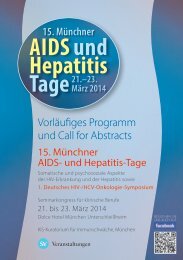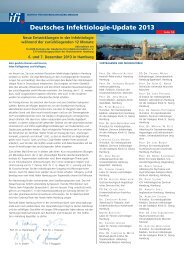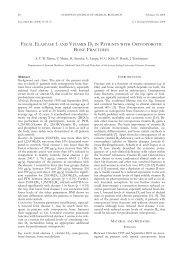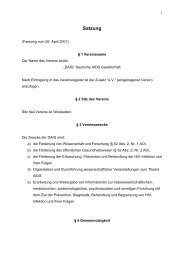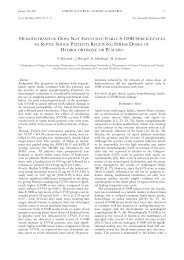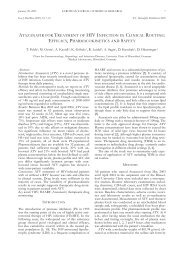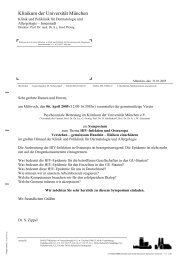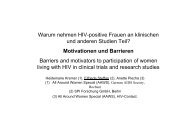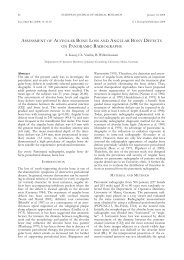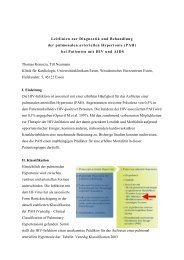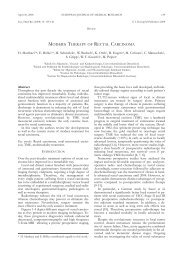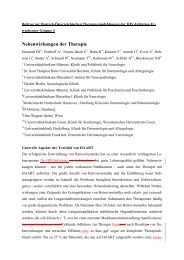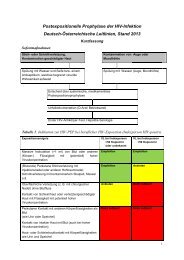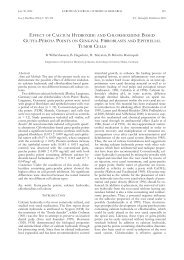European Journal of Medical Research - Deutsche AIDS ...
European Journal of Medical Research - Deutsche AIDS ...
European Journal of Medical Research - Deutsche AIDS ...
Create successful ePaper yourself
Turn your PDF publications into a flip-book with our unique Google optimized e-Paper software.
June 27, 2007 EUROPEAN JOURNAL OF MEDICAL RESEARCH<br />
45<br />
A.50 (Poster)<br />
Transferring intermediary training HIV/<strong>AIDS</strong> to<br />
Hamburg: Signs <strong>of</strong> early success<br />
Robben K. 1 , Wienold M. 2 , Brayer W. 1 , Salmann R. 2 ,<br />
Migranten-Aids Projekt<br />
1 Kinder- und Familienzentrum Schnelsen, Hamburg, Germany,<br />
2 Ethno-medizinisches Zentrum Hannover, Hannover, Germany<br />
Introduction: The number <strong>of</strong> newly diagnosed people with<br />
HIV-infection from high prevalence countries has doubled in<br />
Hamburg since 2000. There is evidence for migrants to be at a<br />
particularly high risk <strong>of</strong> infection and to delay the use <strong>of</strong> German<br />
institutions (e.g. <strong>AIDS</strong>-service organizations). A higher<br />
level <strong>of</strong> discrimination <strong>of</strong> migrants with HIV is found in their<br />
own communities. These issues have been addressed effectively<br />
by training transcultural intermediaries in HIV/<strong>AIDS</strong><br />
prevention and care in Lower Saxony. Is a partnership able to<br />
establish training following this model elsewhere?<br />
Method: A proven model for HIV/<strong>AIDS</strong> prevention in migrants<br />
was adjusted and transferred to the site in Hamburg<br />
(11/05 to 02/07). Selected migrants were trained by experts<br />
(epidemiology, medicine, sexuality, policy and psychology).<br />
The project was evaluated through structured feedback during<br />
the training and by evaluating the group sessions.<br />
Results: 30 bilingual, socially integrated and committed migrants<br />
were selected to participate in the training and campaign.<br />
A curriculum based on 50 hrs <strong>of</strong> training was applied<br />
and followed by supervised group session prepared and evaluated<br />
each by two <strong>of</strong> the intermediator trainees. 24 intermediaries<br />
completed the training and were certified as transcultural<br />
HIV/<strong>AIDS</strong> intermediaries. The training provided insights into<br />
the cultural background <strong>of</strong> HIV/<strong>AIDS</strong> in the countries <strong>of</strong> origin<br />
(e.g. <strong>AIDS</strong> as a punishment in Africa). The campaign highlighted<br />
the singular capacities <strong>of</strong> transcultural intermediaries to<br />
(1) identify target groups and (2) successfully conduct community<br />
group sessions in their respective ethnic communities.This<br />
observation remained valid throughout the project (18 sessions).<br />
Group sessions reached over 200 migrants in ten languages.<br />
The project elicited highest public interest and further<br />
demonstrated demand and opportunities for continuing the<br />
campaign through new funding.<br />
Conclusions: Intermediaries successfully served as HIV/<br />
<strong>AIDS</strong> educators in their respective communities. Training<br />
transcultural HIV/<strong>AIDS</strong> intermediaries is now publicly recommended<br />
in Hamburg (Handlungsplan Integration des Hamburger<br />
Senats). In order to provide a perspective for a selfsustainable<br />
project in Hamburg further effort is needed.<br />
A.51 (Poster)<br />
Improved results <strong>of</strong> evaluation in intercultural<br />
settings: Participation <strong>of</strong> intermediaries in quality<br />
assurance and adaptation<br />
Wienold M. 1 , Kimil A. 1 , Robben K. 2 , Menckhaus B. 3 ,<br />
Sobiech C. 1 , Mönningh<strong>of</strong>f K. 1 , Salman R. 4<br />
1 Ethno-Medizinisches Zentrum, MAP-Team, Hannover,<br />
Germany, 2 Kinder- und Familienzentrum, Hamburg, Germany,<br />
3 Ethno-Medizinisches Zentrum, MiMi-Projekt, Hannover,<br />
Germany, 4 Ethno-Medizinisches Zentrum, Hannover,<br />
Germany<br />
Question: The heterogeneous population <strong>of</strong> migrants in Germany<br />
(reflecting changing patterns in the history <strong>of</strong> immigra-<br />
tion; first and second generation) appear to know less about<br />
health issues than the native German population. The Ethno-<br />
<strong>Medical</strong> Centre in Hannover has established a model for evaluated<br />
health promotion by migrants for migrants. How can the<br />
tools be improved to better evaluate the impact <strong>of</strong> HIV/<strong>AIDS</strong><br />
prevention in migrant communties?<br />
Methods: Evaluation developed for health prevention campaigns<br />
in migrant communities in Germany (MiMi-Projekt)<br />
were adapted to the HIV/<strong>AIDS</strong> field following principles <strong>of</strong><br />
continuous quality improvement and community orientation.<br />
The tools were developed in a multi-cultural and multi-pr<strong>of</strong>essional<br />
team, followed by feedback from trained transcultural<br />
intermediaries and than translated (by intermediaries).<br />
The questionnaires for participants in community group sessions<br />
were bilingual. The validity <strong>of</strong> evaluation results was<br />
assessed. Data collected during a project in Hamburg (2006)<br />
were analysed using quantitative and qualitative methods.<br />
Results: The materials were reviewed and adapted by trained<br />
intermediaries into e.g. Pidgin English. Questionnaires were<br />
successfully applied in six languages. The bilingual texts allowed<br />
evaluation in the team (German is the lingua franca <strong>of</strong><br />
the project). A total <strong>of</strong> 21 community group session resulted<br />
in over 200 questionnaires returned reflecting ten different<br />
ethnicities (language groups). A preliminary evaluation <strong>of</strong><br />
115 questionnaires showed valid results relating to gender, recruitment,<br />
knowledge and feedback on quality <strong>of</strong> community<br />
group sessions and on information provided:<br />
(1)Female migrants were in the majority,<br />
(2)recruitment into community group sessions mostly worked<br />
through personal invitation,<br />
(3)basic knowledge is highly variable with evidence for relevant<br />
deficits (e.g. homophobia),<br />
(4)the feedback was highly positive. Open questions required<br />
translation into German for evaluation.<br />
Conclusions: Evaluation tools can be improved by making<br />
use <strong>of</strong> interemdiaries. Open questions remain to pose a particular<br />
obstacle for evaluation in this context. Standard criteria<br />
for community orientation in quality assurance may serve to<br />
further improve outcomes.<br />
A.52 (Poster)<br />
Intercultural Competence (IC) in the scope <strong>of</strong><br />
outpatient medical care for migrants living with<br />
HIV/Aids (MHA)<br />
Jansen K. 1 , Kleiber D. 1<br />
1 Free University Berlin, Institute for Public Health and psychosocial<br />
Health <strong>Research</strong>, Berlin, Germany<br />
Objective: MHA are said to be underrepresented in practices<br />
specialised on HIV, but only few data are existent for the German<br />
situation. As barriers for access and contenting diagnostics<br />
and treatment for MHA, culturally differing theories <strong>of</strong><br />
sickness and social interaction, language problems as well as<br />
material and legitimate restrictions are considered. A study<br />
was carried out to clarify the extent and terms <strong>of</strong> outpatient<br />
medical care for MHA. Factors <strong>of</strong> good medical practise regarding<br />
MHA were surveyed, too.<br />
Methods: In Berlin, all HIV specialised (N1=28) and a sample<br />
<strong>of</strong> regular (N2=841) practices were surveyed via a standardised<br />
questionnaire. Data were gained on structure <strong>of</strong> practices<br />
and composition <strong>of</strong> their migrated clientele, on communication<br />
and interaction problems (scale: 0 (no) - 9 (very<br />
high)) with MHA and on degree <strong>of</strong> IC within the practices. To



